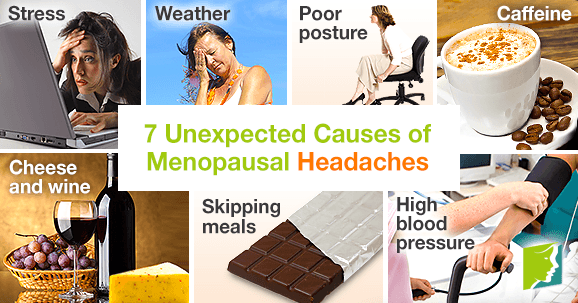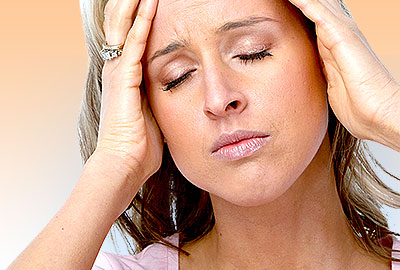Hormonal imbalance - the fluctuation of estrogen and progesterone - is the leading cause of menopausal headaches. Because of this women are more prone to experiencing them more often and more severely during perimenopause. It has been shown that women experience migraine headaches up to five times more than men. Migraines are generally described as a severe, recurrent, throbbing pain that starts on one side of the head, and lasts for anywhere between a few hours to a few days. In addition to hormone fluctuations, there are many other unexpected causes of menopausal headaches and migraines, like stress, weather, or poor posture. Keep reading to learn more about these causes.
Stress
Stress is one of the primary causes of headaches in women during menopause. A few simple solutions to reduce stress include, regular aerobic exercise, yoga or meditation, walking, swimming, and taking time to relax and read a book.
Weather
Sudden changes in the weather can make women more likely to get headaches during menopause. Changes in barometric pressure, temperature, and brightness are the most common culprits. Sunny days are more likely to cause headaches, so try wearing sunglasses and avoiding the midday sun as much as possible to prevent this.
Poor Posture
Poor posture encourages pressure to build in the neck and head muscles, causing painful headaches. It can be caused by hunched shoulders, slouching, or simply looking at a monitor that is too high or too low.
Cheese and Wine
As enjoyable as these two are, they can unfortunately cause headaches. Aged cheese contains a substance called tyramine, which has been revealed as one of the most common headache triggers, especially for chronic migraine sufferers. Red wine is a double threat because it contains alcohol, which decreases blood flow to the brain and in doing so makes headaches worse.
Caffeine
Although caffeine can be beneficial in moderation, chain-drinking it can dehydrate the body and in doing so cause headaches. Conversely, if you have already developed a dependency on caffeine, cutting it out abruptly can cause headaches. Try gradually decreasing caffeine intake to one or two cups of coffee a day.
Skipping Meals
Skipping meals causes a dip in blood sugar, which can quickly trigger headaches. Try to avoid candy bars, because their high sugar content will result in a spike in blood sugar and then a crash. Eating healthy, balanced meals and snacks every three to four hours is recommended.
High Blood Pressure
Headaches are a common symptom of high blood pressure, because they cause blood vessels to stiffen and become inflamed. Despite the common myth that people with high blood pressure should avoid exercise, it is recommended to incorporate some low-impact exercise to help alleviate these headaches.
Menopausal headaches are a bothersome symptom that almost every woman experiences at some point during her transition into menopause. The most well-known culprit, hormonal imbalance, is more difficult to manage and treat. However, the causes featured in this article are easier to manage. Making simple lifestyle changes - like getting regular exercise, eating healthy meals, and reducing stress - are all ways of helping prevent menopausal headaches.
Sources
- National Health Service UK. (2013). Hormone headaches. Retrieved July 17, 2014 from, http://www.nhs.uk/livewell/headaches/pages/hormonalheadaches.aspx
- Office on Women's Health. (2010). Menstruation, menopause, and mental health. Retrieved July 17, 2014, from http://www.womenshealth.gov/mental-health/menstruation-menopause/
- Office on Women's Health. (2012). Migraine fact sheet. Retrieved July 17, 2014, from http://www.womenshealth.gov/publications/our-publications/fact-sheet/migraine.html




